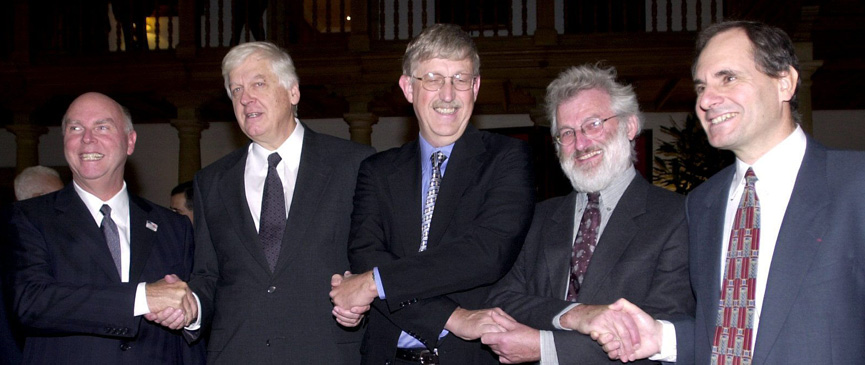The Princess of Asturias Foundation
Sección de idiomas
Fin de la sección de idiomas
Sección de utilidades
Fin de la sección de utilidades
- The Foundation
- HM The King
- HRH The Princess of Asturias
- 2023 Special
- Princess of Asturias Awards
- Area of Communication and Media
- Music Department
- Exemplary Town of Asturias Award
- 2012 Special
- 2013 Special
- 2014 Special
- 2015 Special
- 2016 Special
- 2017 Special
- 2018 Special
- 2019 Special
- 2020 Special
- 2021 Special
- 2022 Special
-
Important: COVID-19
-
Terms of Use
You are in:
Laureates
Start of main content
Craig Venter, John Sulston, Francis Collins, Hamilton Smith and Jean Weissenbach
Prince of Asturias Award for Technical & Scientific Research 2001

The world's leading teams researching into the human genome were granted the Award. The teams are from The Sanger Centre in the United Kingdom, directed by John Sulston, from the National Human Genome Research Institute, under the leadership of Francis Collins, from Celera Genomics (U.S.A.) led by Craig Venter and Hamilton Smith and from Genoscope in France, under the directorship of Jean Weissenbach.
The complete mapping of the Genome is one of the most ambitious projects in the history of Science. Its conclusion will usher in a new era in the treatment of illnesses. Spectacular breakthroughs in the complete molecular and physiological analysis of genes and their interactions will bring genetic predisposition to suffering illnesses to light, thereby leading to better prevention policies to combat them.
Craig Venter
See more
Craig Venter (Salt Lake City, Utah, USA, 1946) is a veteran of the war in Vietnam, where he served in the medical corps. During the seventies he was a lecturer at the State University of New York, and in the eighties he joined the National Institutes of Health. He left there in 1997 to set up his own company, Celera, a subdivision of Perkin Elmer, and to speed up the complete sequencing of the human genome. In his role as scientific director of Celera Genomics Corporation he has discovered over half the 30.000 human genes that have been discovered. One of his successes was to decipher the complete sequence of the Haemophilus influenzae bacteria.
John Sulston
See more
John Sulston (Cambridge, Great Britain, 1942 - 2018) began his scientific career in the seventies at Cambridge, where he graduated in Organic Chemistry, and the obtained his doctorate. He spent a few years in La Jolla (California) before returning in 1969 to the Medical Research Council in Cambridge. He was the director of the Sanger Centre of the Wellcome Trust in Cambridge, and one of his first successes was to decipher the complete sequence of the Caenorhabditis elegans nematode. He has been a leading advocate of international cooperation in the ambitious task of deciphering the human genome in the public sector. The Sanger Centre has set up the "genome campus", Europe's biggest contribution to the Genome Project.
John Sulston accepted the Prince of Asturias Award on behalf of the International Human Genome Sequencing Consortium, which released the sequence of the human genome freely and without restriction, for the benefit of all humankind.
Hamilton Smith
See more
Hamilton Smith (New York, USA, 1931) was awarded the Nobel Prize for Medicine in 1978, he studied Medicine at the universities of Illinois, California and John Hopkins University School of Medicine in Baltimore. He has been director of the DNA research department at Celera Genomics Corporation since 1998, and has thus had a fundamental influence on the discovery and publicising of the human genome map. He is a member of the U.S.A.'s National Academy of Sciences, of the American Microbiology Society, and of the Society of Biological Chemists.
Francis Collins
See more
Francis Collins (Staunton, Virginia, USA, 1950) received his doctorate in Chemistry from Yale University, and graduated as a doctor at the University of North Carolina. He has spent most of his career carrying out research at national public health institutions in the U.S.A., where he has lead the Human Genome Project, which 18 different countries are involved in, since 1999. He has identified the gene responsible for multiple endocrine neoplasia, and has carried out extensive searches amongst the people of Finland for the gene that is a risk factor for diabetes. He has promoted new forms of cloning to study the genes involved in cystic fibrosis, neurofibromatosis and Huntington's Disease.
Francis Collins has accepted the Prince of Asturias Award on behalf of the International Human Genome Sequencing Consortium, which has released the sequence of the human genome freely and without restriction, for the benefit of all humankind.
Jean Weissenbach
See more
Jean Weissenbach (Strasbourg, France, 1946) studied Mathematics and Pharmaceutics, and has a doctorate in Science from his hometown University of Strasbourg. He has been director of research at France's National Centre for Scientific Research (CNRS) and is at present the director of Genoscope. He has made major contributions to molecular genetics and chromosome mapping which have been the foundation for positional cloning of human genes involved in numerous illnesses and for the further progress in the task of sequencing the human genome..
End of main content
Sección de utilidades
Fin de la sección de utilidades
- Legal document Legal document (Access key 8)
- | Privacy policy Privacy policy (Access key )
- | Social networks ???en.portal.pie.menu107.title???
- | Cookies ???en.portal.pie.menu110.title???
- | Site map Site Map (Access key 3)
- | Contact Contact (Access key )
- | XHTML 1.0
- | CSS 2.1
- | WAI 'AA
© Copyright 2024. FUNDACIÓN PRINCESA DE ASTURIAS



